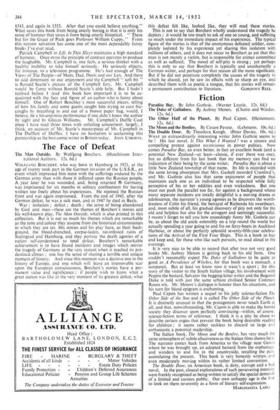The Face of Defeat
WOLFGANG BORCHERT, who was born in Hamburg in 1921, at the age of twenty took part in the German invasion of the U.S.S.R., an event which impressed him more with the sufferings endured by the German army than with those it inflicted upon the Russian people. A year later he was wounded, and, being returned lb Germany, was imprisoned for six months in solitary confinement for having written too freely about his experiences. He rejoined the Russian front and was again imprisoned. From the end of 1945, after the German defeat, he was a sick man, and in 1947 he died in Basle.
War ; isolation ; defeat ; death ; the sense of being abandoned by God and man—these are the themes of Borchert's stories and his well-known play, The Man Outside, which is also printed in this collection. But it is not so much his themes which are remarkable as the tone and colour they assume from the historical circumstances in which they are set. His stories and his play have, as their back- ground, the blood-drenched, corpse-laden, rat-infested ruins of Stalingrad and Hamburg, and they portray the death agonies of a nation self-condemned to total defeat. Borchert's remarkable achievement is to have found incidents and images which mirror the tragedy of Germany at the very instant when it reached its pre- destined climax ; one has the sense of sharing a terrible and unique moment of history. And since this moment was a decisive one in the history of Europe, and one which will leave an irremovable scar upon the European consciousness, Borchert's stories have a per- manent value and significance ; if people wish to know what a great nation was like at the very moment of its greatest defeat, what
this defeat felt like, looked like, they will read these stories.
This is not to say that Borchert wholly understood the tragedy he depicts ; it would be too much to ask of one so young, and suffering so much under the immediate impact of his experience. The typical figure of the stories is that of the anonymous defeated soldier, com- pletely isolated by his experience yet sharing this isolation with millions of others, and it does not occur to Borchert as yet that this man is not merely a victim, but is responsible for crimes committed as well as suffered. The mood of self-pity is strong ; yet perhaps this is only to say that Borchert is typically and unashamedly a German writer, and perhaps for that reason all the more significant. But if he did not penetrate completely the causes of the tragedy in which he shared, yet he saw its effects with so sharp, an eye, and described them with so poetic a tongue, that his stories will remain a permanent contribution to literature. GORONWY REES.










































 Previous page
Previous page